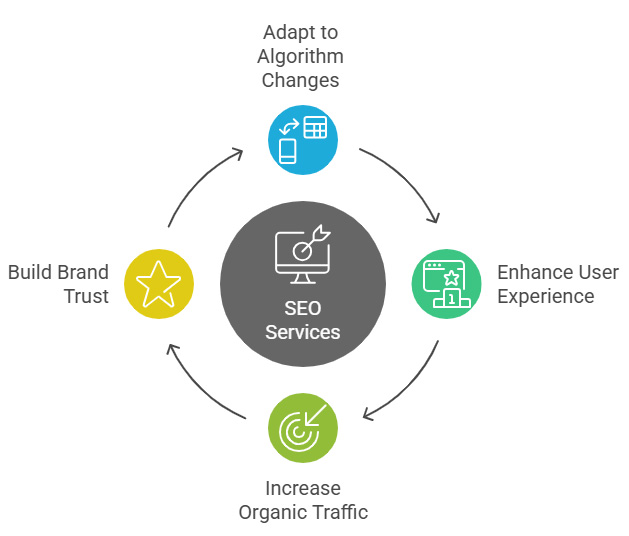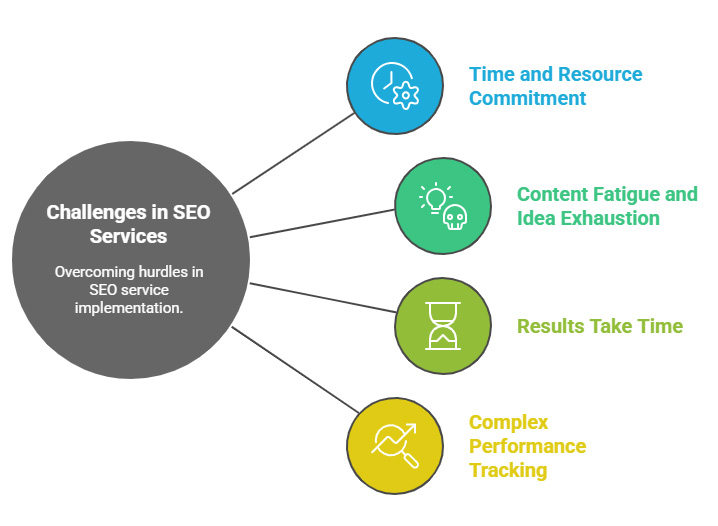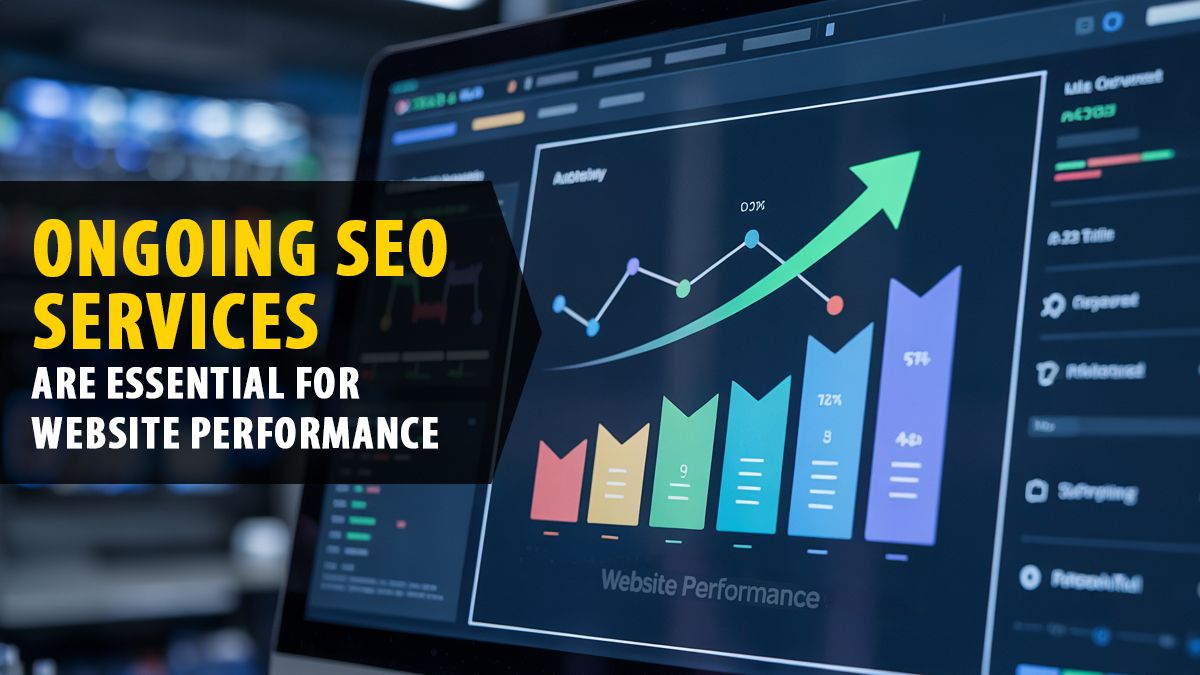SEO isn’t just a one-time task; it’s something you keep doing as your business, audience, and search engines change. Ongoing SEO services involve constantly improving your website’s content, technical functions, and credibility to keep it visible in results pages and make it better over time.
In a world that is always changing, doing nothing will cause you to get left behind. New competitors appear, Google changes its rules, and how people use services changes. If you don’t keep working on SEO, your rankings and website visitors can drop fast.
No matter if you have a blog, an online store, or a business website, keeping up with SEO helps you stay up-to-date, relevant, and competitive. In this post, we’ll look at the best practices for ongoing SEO that lasts a long time.
Advantages of Ongoing SEO Services

Consistent Increase in Organic Traffic
Ongoing SEO can help bring steady traffic to your website over time. Unlike paid ads that stop showing when you run out of money, SEO helps your website appear naturally in results pages, bringing visitors consistently.
By regularly updating your content, using new keywords, and keeping your website working well, you help make sure people can always find you. This organic traffic is usually better because users are actively looking for your services, or information.
With every month of steady SEO work, your rankings, visibility, and trust increase together, bringing bigger rewards over time. Ongoing SEO services make your website a machine that attracts more visitors over time, helping your overall marketing and sales efforts.
Getting Used to Changes in Algorithms
Search engines are always improving how they work to give users better and more relevant results. What worked six months ago might not work anymore. Ongoing SEO services help your website stay flexible, so you can adjust to big changes and avoid mistakes that could harm your rankings quickly.
Whether it’s updates from Google, changes in guidelines about E-E-A-T, or how content is sorted and rated, having a steady SEO plan means you are always keeping an eye on things and making changes when needed.
This way of taking action helps you stay in front of competitors who only respond after problems happen. By keeping up with changes in search trends instead of just responding to them, you make sure your website stays effective, important, and ready for future success.
Better User Experience
SEO isn’t just about using the right words and getting high rankings, it’s really about making the experience better for users. Regular site checks help find and fix broken links, slow loading pages, or tricky navigation, which all impact how users use your site.
Search engines like websites that are easy to use, load fast, and work without issues on phones. By regularly changing your website according to SEO tips and how users act, you can lower bounce rates and get more people interested.
Also, well-prepared content helps users move from learning about something to making a purchase. When your SEO plan makes user experience a main priority, you not only improve your rankings but also make it more likely that visitors will spend more time on your site, buy more often, and come back later.
More Trusted and Powerful Brand
Today, just being seen online isn’t enough; you also need to be trustworthy. Ongoing SEO helps create both. When your website always shows up at the top of results pages, people see your brand as reliable and important.
Regularly sharing useful and detailed information shows your knowledge and keeps your audience interested. Also, slowly getting good links from trustworthy websites helps increase your credibility with both crawlers and users.
As time goes by, having a good reputation gives you an edge over others. People believe what they see often and what is useful to them. By consistently working on SEO, you make your brand seen as a trustworthy leader in your field.
Stay Updated with Google
Google often updates its algorithms, so the best practices are always changing. A few years ago, the Penguin and Medic updates made many websites drop in their rankings because they didn’t meet Google’s new standards.
Recently, Google has started using new things to decide how to rank websites, like ease of use on mobile devices, how fast pages load, and updates to useful content. You can’t predict what new changes the next algorithm will create.
Along with big changes to algorithms, there are small updates that happen often. These might also mean you need to change your SEO strategy a bit. Keep an eye on the changes in the algorithms to optimize your SEO accordingly.
Monitor Your Analytics

To improve your website, you need to keep an eye on your metrics and make changes when needed.
Keywords: You should always test and keep track of keywords because they are very important for SEO. Over time, some keywords may work better or worse. You might need to change your keywords when you add new products or remove them.
Backlinks: They still matter for ranking your site, but only if they are from important and trustworthy sources. It’s good to know which websites give you the best backlinks. It’s also helpful to look at your competitors and see where they get their links from.
Traffic and Engagement: Besides checking which keywords and topics get you the most visitors, you also want to see how involved they are. This includes how often people leave your page quickly and how long they stay on your page or website.
Site Performance: It’s important to check how well your content is doing and how engaging your users are on your website. If people can’t find what they’re looking for on your site, more of them will leave without staying. Looking at the things that affect performance is important for staying updated in your field and improving your conversion rates.
Page Popularity: It’s important to regularly check which pages on your website are popular and getting a lot of views, and which ones hardly anyone looks at. This is an ongoing task for improving your site’s SEO. Looking at this page’s data in Google Analytics can give you a list of pages that need updated content. Adding CTAs to busy pages (or any pages) can help get more people to take action.
By looking at your data, you can decide what to do next. However, all of this requires you to pay attention all the time. Data is always changing, and you need to stay updated to make your SEO work well.
Reviews and Feedback
You should pay attention to your customers and visitors as much as you do to search engines. This includes what they tell you directly and what they say about you on social media and review websites.
Readers should guide your content marketing. For example, if people ask for information on a specific subject, you can make topics and titles that fit their interests.
Customer reviews are becoming more important for local SEO. Google looks at reviews when deciding how to rank websites, favoring businesses that have more good reviews. Getting positive reviews is something you need to keep working on. You should check in with customers often and reply to them.
Keep an Eye on the Competition
SEO is a highly competitive field. Ranking your site means doing better than your competitors. When you first publish a webpage or blog post, it might show up high in results pages.
But usually, other businesses will be keeping an eye on you and trying to rank higher than you for important search terms. Since SEO is always about trying to rank higher, you can’t overlook your competitors. They can tell you what words and topics your customers will like.
SEO Needs Ongoing Attention
Some experts say that SEO is mainly about content marketing, even though a lot of people think of them as different things. Google is giving more credit to websites that share useful and unique information for their readers.
A good plan for your content goes along with a useful plan for SEO. Content marketing is a process that keeps happening and changing over time. To do well in search engines and connect with your readers, you should regularly post good content about topics that matter.
This connects with many other reasons why SEO should never stop. To have a good content plan, you need to stay updated with the latest trends in your field, pay attention to what your audience wants, and closely track your data.
SEO and Content Marketing Go Hand in Hand
It would be great if you could do some SEO tasks once and then always have your website rank well. Sadly, that’s not how the world functions. SEO is a fast-changing and very competitive area.
There are many things to think about with Google, your customers, and your competitors. If you want to succeed and stay successful, you need to work hard and pay attention.
Also Read: 12 Types of SEO Services That Complete The SEO Strategy for Your Business
Challenges in Ongoing SEO Services

Time and Resource Commitment
One of the biggest challenges with ongoing SEO services is that it requires a lot of time, effort, and money. SEO is not a one-time task; it’s something you need to keep working on for a long time.
Creating content, checking keywords, fixing technical issues, and reaching out for backlinks all need regular work from knowledgeable experts. For small teams or businesses with few resources, keeping up the momentum can feel really hard.
You will need writers, analysts, planners, and sometimes developers to make changes and check how things are working. If you don’t have a clear plan and set your priorities, you can end up trying to do too many things at once.
Content Fatigue and Idea Exhaustion
Maintaining the creative energy needed to keep making new content is difficult. As you create groups of related keywords and post often, it can be harder to come up with new topics that are still useful for crawlers and what people are looking for.
This is especially true in crowded markets where many companies are sharing similar information. Teams might begin reusing old ideas or creating lower-quality content just to reach their goals.
This can damage the rankings and harm the brand image. Also, trying too hard to use keywords can happen when you’re out of ideas. To fix this, you need a strong plan for creating content.
Results Take Time
SEO takes time to show results. Unlike paid ads that can quickly bring people to your site, SEO work can take months to see real results. This delay can be frustrating for people who are hoping for fast results or a clear return on their investment.
To get better rankings, more visitors, and more people seeing your content, many things matter, like how trusted your site is, how many other sites you’re competing with, and how often crawlers check your site.
Even if you follow all the best tips, search engines might still take a while to find and rank your content. This leads to a feeling of impatience when your hard work doesn’t seem to pay off.
Complex Performance Tracking
Measuring how well your SEO is doing is not as simple as counting ad clicks or sales. There are many ways to measure a website’s performance, like rankings, views, visitors from search engines, how quickly people leave the site, links from other sites, how fast the pages load, and the site’s authority, among others.
Choosing which ones are the most important depends on what you want to achieve, your industry, and how your business works. Without a clear plan, it can be confusing and easy to misunderstand the results. For example, if you lose rank for one keyword, it might be balanced out by getting better rankings for more important keywords.
But you need to look closely at the data to find that out. Tools like Google Search Console and GA4 are useful, but they can be a bit difficult to learn at first. To deal with this problem, businesses need regular reports, smart analysis, and a plan based on data.
Final Thoughts
Ongoing SEO isn’t just a way to market your business, it’s a lasting investment in the future of your brand online. SEO doesn’t give quick results, but doing it regularly helps create steady online visitors, builds trust with your audience, and gives you an advantage over competitors in your market.
It helps you adjust to changes in algorithms, make things better for users, and build your reputation over time. Yes, it takes time, hard work, and some money, but the results are better visibility and steady growth over time. As the name suggests it is a continuous process and you need to update yourself regularly.
Instead of following trends or trying to get quick success, focus on a plan that will create lasting progress. Begin with small steps, keep doing them regularly, and consider ongoing SEO services as a crucial part of your online foundation.
FAQs
How long does it take to notice changes from ongoing SEO?
The results from your SEO work usually start to show up in about 3 to 6 months. This can vary based on a few things: how healthy your website is, how much competition there is, how strong your website’s reputation is, and how good your content is. For very competitive industries or new websites, it may take more time. SEO is a slow process that gets stronger little by little over time, unlike paid ads that work right away.
Should I hire an SEO agency, or can I do it myself?
It depends on what your team knows, how much time you have, and what tools you can use. You can do SEO yourself if you have team members who know about keywords, website checks, and data analysis. Choosing a good agency can save you time, give you access to better tools, and offer expert advice for your project. A mixed method also works: keep your content created by your team and hire SEO experts to handle technical tasks or backlinks.
How do changes to algorithms impact my SEO work?
Changes to algorithms can greatly affect your rankings, how much traffic you get, and how visible you are. Google frequently changes how it checks the quality of content, the experience users have, the trustworthiness of the source, and how relevant the information is. If your SEO plan is old or depends too much on quick tricks, changing it could make your rankings fall. Websites that regularly provide useful information and meet Google’s changing rules are less likely to be affected by updates.
Is ongoing SEO worth the money?
Yes, especially if you think of it as something you’ll benefit from in the long run. Ongoing SEO helps bring in free visitors to your website without needing to spend money on ads all the time, unlike paid methods. It helps create a strong brand, makes things easier for users, and brings better results as time goes on. The costs can change based on how big the project is, but the ROI from SEO generally increases the longer you keep it up.
How does ongoing SEO fit in with other online marketing efforts?
Ongoing SEO helps with almost everything in digital marketing. It makes it easier for people to see your marketing content, improves how well your paid ads work by making landing pages more relevant, and increases the number of people who take action on your site by providing a better user experience and page layout. SEO information, such as what people are searching for and popular keywords, can help plan email campaigns, social media updates, and product creation.
























